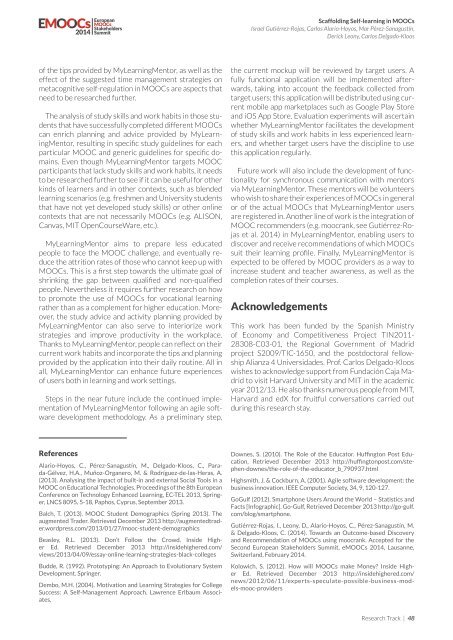zmWmQs
zmWmQs
zmWmQs
You also want an ePaper? Increase the reach of your titles
YUMPU automatically turns print PDFs into web optimized ePapers that Google loves.
Scaffolding Self-learning in MOOCs<br />
Israel Gutiérrez-Rojas, Carlos Alario-Hoyos, Mar Pérez-Sanagustín,<br />
Derick Leony, Carlos Delgado-Kloos<br />
of the tips provided by MyLearningMentor, as well as the<br />
effect of the suggested time management strategies on<br />
metacognitive self-regulation in MOOCs are aspects that<br />
need to be researched further.<br />
The analysis of study skills and work habits in those students<br />
that have successfully completed different MOOCs<br />
can enrich planning and advice provided by MyLearningMentor,<br />
resulting in specific study guidelines for each<br />
particular MOOC and generic guidelines for specific domains.<br />
Even though MyLearningMentor targets MOOC<br />
participants that lack study skills and work habits, it needs<br />
to be researched further to see if it can be useful for other<br />
kinds of learners and in other contexts, such as blended<br />
learning scenarios (e.g. freshmen and University students<br />
that have not yet developed study skills) or other online<br />
contexts that are not necessarily MOOCs (e.g. ALISON,<br />
Canvas, MIT OpenCourseWare, etc.).<br />
MyLearningMentor aims to prepare less educated<br />
people to face the MOOC challenge, and eventually reduce<br />
the attrition rates of those who cannot keep up with<br />
MOOCs. This is a first step towards the ultimate goal of<br />
shrinking the gap between qualified and non-qualified<br />
people. Nevertheless it requires further research on how<br />
to promote the use of MOOCs for vocational learning<br />
rather than as a complement for higher education. Moreover,<br />
the study advice and activity planning provided by<br />
MyLearningMentor can also serve to interiorize work<br />
strategies and improve productivity in the workplace.<br />
Thanks to MyLearningMentor, people can reflect on their<br />
current work habits and incorporate the tips and planning<br />
provided by the application into their daily routine. All in<br />
all, MyLearningMentor can enhance future experiences<br />
of users both in learning and work settings.<br />
Steps in the near future include the continued implementation<br />
of MyLearningMentor following an agile software<br />
development methodology. As a preliminary step,<br />
the current mockup will be reviewed by target users. A<br />
fully functional application will be implemented afterwards,<br />
taking into account the feedback collected from<br />
target users; this application will be distributed using current<br />
mobile app marketplaces such as Google Play Store<br />
and iOS App Store. Evaluation experiments will ascertain<br />
whether MyLearningMentor facilitates the development<br />
of study skills and work habits in less experienced learners,<br />
and whether target users have the discipline to use<br />
this application regularly.<br />
Future work will also include the development of functionality<br />
for synchronous communication with mentors<br />
via MyLearningMentor. These mentors will be volunteers<br />
who wish to share their experiences of MOOCs in general<br />
or of the actual MOOCs that MyLearningMentor users<br />
are registered in. Another line of work is the integration of<br />
MOOC recommenders (e.g. moocrank, see Gutiérrez-Rojas<br />
et al. 2014) in MyLearningMentor, enabling users to<br />
discover and receive recommendations of which MOOCs<br />
suit their learning profile. Finally, MyLearningMentor is<br />
expected to be offered by MOOC providers as a way to<br />
increase student and teacher awareness, as well as the<br />
completion rates of their courses.<br />
Acknowledgements<br />
This work has been funded by the Spanish Ministry<br />
of Economy and Competitiveness Project TIN2011-<br />
28308-C03-01, the Regional Government of Madrid<br />
project S2009/TIC-1650, and the postdoctoral fellowship<br />
Alianza 4 Universidades. Prof. Carlos Delgado-Kloos<br />
wishes to acknowledge support from Fundación Caja Madrid<br />
to visit Harvard University and MIT in the academic<br />
year 2012/13. He also thanks numerous people from MIT,<br />
Harvard and edX for fruitful conversations carried out<br />
during this research stay.<br />
References<br />
Alario-Hoyos, C., Pérez-Sanagustín, M., Delgado-Kloos, C., Parada-Gélvez,<br />
H.A., Muñoz-Organero, M. & Rodríguez-de-las-Heras, A.<br />
(2013). Analysing the impact of built-in and external Social Tools in a<br />
MOOC on Educational Technologies. Proceedings of the 8th European<br />
Conference on Technology Enhanced Learning, EC-TEL 2013, Springer,<br />
LNCS 8095, 5-18, Paphos, Cyprus, September 2013.<br />
Balch, T. (2013). MOOC Student Demographics (Spring 2013). The<br />
augmented Trader. Retrieved December 2013 http://augmentedtrader.wordpress.com/2013/01/27/mooc-student-demographics<br />
Beasley, R.L. (2013). Don’t Follow the Crowd. Inside Higher<br />
Ed. Retrieved December 2013 http://insidehighered.com/<br />
views/2013/04/09/essay-online-learning-strategies-black-colleges<br />
Budde, R. (1992). Prototyping: An Approach to Evolutionary System<br />
Development. Springer.<br />
Dembo, M.H. (2004). Motivation and Learning Strategies for College<br />
Success: A Self-Management Approach. Lawrence Erlbaum Associates.<br />
Downes, S. (2010). The Role of the Educator. Huffington Post Education,<br />
Retrieved December 2013 http://huffingtonpost.com/stephen-downes/the-role-of-the-educator_b_790937.html<br />
Highsmith, J. & Cockburn, A. (2001). Agile software development: the<br />
business innovation. IEEE Computer Society, 34, 9, 120-127.<br />
GoGulf (2012). Smartphone Users Around the World – Statistics and<br />
Facts [Infographic]. Go-Gulf, Retrieved December 2013 http://go-gulf.<br />
com/blog/smartphone.<br />
Gutiérrez-Rojas, I., Leony, D., Alario-Hoyos, C., Pérez-Sanagustín, M.<br />
& Delgado-Kloos, C. (2014). Towards an Outcome-based Discovery<br />
and Recommendation of MOOCs using moocrank. Accepted for the<br />
Second European Stakeholders Summit, eMOOCs 2014, Lausanne,<br />
Switzerland, February 2014.<br />
Kolowich, S. (2012). How will MOOCs make Money Inside Higher<br />
Ed. Retrieved December 2013 http://insidehighered.com/<br />
news/2012/06/11/experts-speculate-possible-business-models-mooc-providers<br />
Research Track | 48


